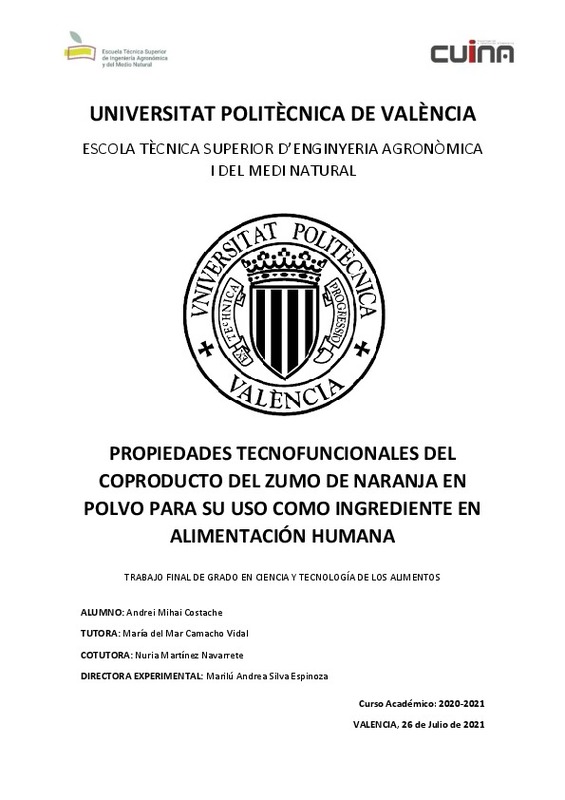|
Resumen:
|
[ES] En la elaboración de productos por la industria alimentaria, desde la recepción de las materias primas hasta su consumo, se generan grandes cantidades de residuos que tienen un alto impacto negativo en la sostenibilidad ...[+]
[ES] En la elaboración de productos por la industria alimentaria, desde la recepción de las materias primas hasta su consumo, se generan grandes cantidades de residuos que tienen un alto impacto negativo en la sostenibilidad del planeta. En el caso de la industria de la transformación de frutas, la gestión adecuada y la conversión del residuo en un recurso, intentando llegar a la generación “cero de residuos”, no sólo aportaría un respiro al planeta, sino que podría aportar también nuevos ingredientes para la alimentación humana. Por otra parte, los ingredientes naturales en la industria alimentaria, cosmética y farmacéutica están aumentando en los últimos años y son cada vez más demandados por los consumidores, para cumplir con la normativa actual europea que apuesta por los compuestos naturales en lugar de los sintéticos. En este sentido, el residuo obtenido después de la extracción del zumo de naranja, una vez deshidratado, por sus problemas de degradación debido a su alto contenido en agua, y convertido en polvo, podría transformarse en un producto comercial con función tecnológica interesante. Por su composición podría tener potencial como ingrediente funcional en relación con los aspectos organolépticos, microestructurales y mecánicos/físicos. Así, podría mejorar la estabilidad y la textura de emulsiones, inhibir la sinéresis o actuar como agente gelificante y/o espesante, por ejemplo. Este trabajo se centra en la caracterización tecnofuncional del residuo derivado de la extracción del zumo de naranja, liofilizado y en polvo. Además, y teniendo en cuenta que los alimentos deshidratados y con alto contenido en azúcares necesitan de la incorporación de biopolímeros de alto peso molecular para su estabilización física, se ha estudiado la influencia de goma arábiga en las propiedades analizadas. Los resultados obtenidos indican que la presencia de goma mejora la flotabilidad, disminuye la higroscopicidad y favorece la instantaneidad en agua del coproducto del zumo de naranja en polvo, aunque dificulta la interacción con la grasa.
[-]
[EN] In the elaboration of products by the food industry, from the reception of raw materials to their
consumption, large quantities of waste are generated that have a high negative impact on the
sustainability of the ...[+]
[EN] In the elaboration of products by the food industry, from the reception of raw materials to their
consumption, large quantities of waste are generated that have a high negative impact on the
sustainability of the planet. In the case of the fruit processing industry, the proper management
and conversion of waste into a resource, trying to reach "zero waste" generation, would not only
bring a respite to the planet, but could also provide new ingredients for human nutrition. On the
other hand, natural ingredients in the food, cosmetics and pharmaceutical industries have been
increasing in recent years and are increasingly in demand by consumers, in order to comply with
current European regulations that favour natural compounds over synthetic ones. In this sense,
the residue obtained after the extraction of orange juice, once dehydrated, due to its
degradation problems due to its high water content, and converted into powder, could be
transformed into a commercial product with an interesting technological function. Due to its
composition, it could have potential as a functional ingredient in relation to organoleptic,
microstructural and mechanical/physical aspects. Thus, it could improve the stability and texture
of emulsions, inhibit syneresis or act as a gelling and/or thickening agent, for example. This work
focuses on the techno-functional characterisation of the freeze-dried and powdered orange
juice extraction residue. In addition, and taking into account that dehydrated foods with a high
sugar content require the incorporation of high molecular weight biopolymers for their physical
stabilisation, the influence of gum arabic on the properties analysed has been studied. The
results obtained indicate that the presence of gum improves the buoyancy, decreases the
hygroscopicity and favours the water instantaneity of the orange juice powder co-product,
although it hinders the interaction with fat.
[-]
|







